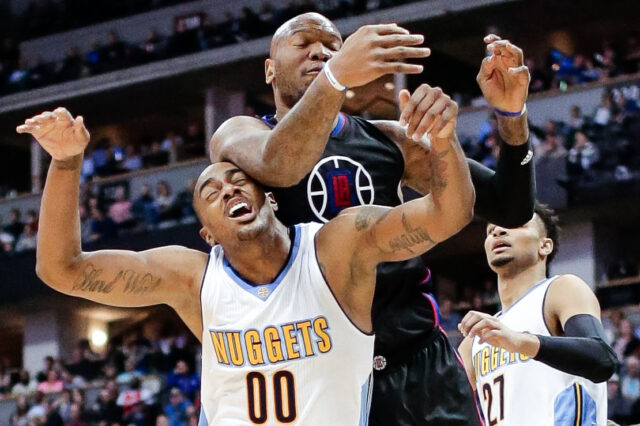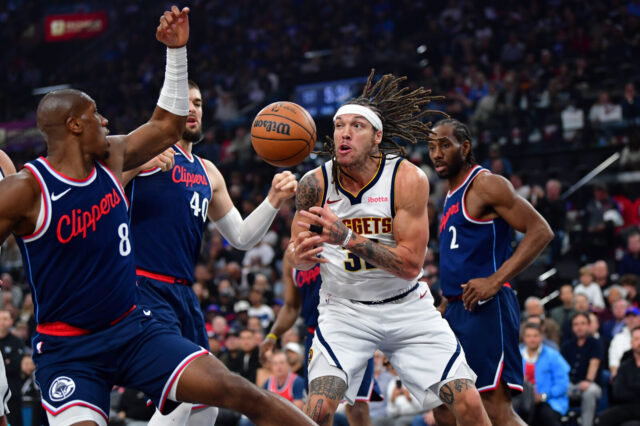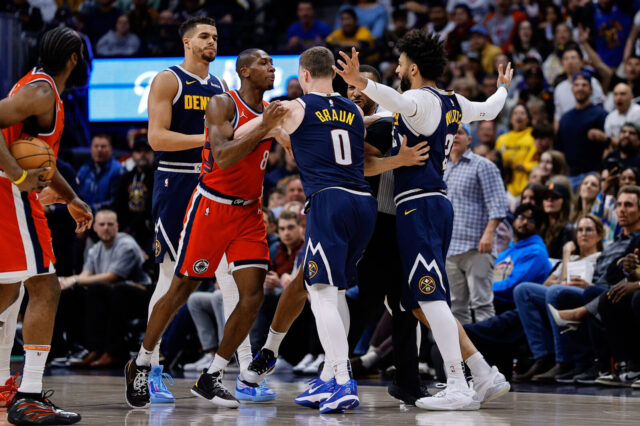“They never should’ve let George Karl go.”
That’s the most common comment we get at Denver Stiffs. Often times they come after a tough loss, something that Nuggets fans are becoming increasingly familiar with. Karl’s departure from the team has followed the Nuggets like a ghost, haunting the fanbase every time the team goes on a losing streak or blows a fourth quarter lead. “Where would the team be if Karl was still coaching?”
Few moments have been as pivotal for an NBA franchise as the final weeks of George Karl’s tenure. Under coach Karl, the Nuggets had reached the pinnacle of relevancy here in Denver. The team made the playoffs for eight straight years under Karl, including a trip to the western conference finals in 2009. After the departure of Carmelo Anthony in 2011, many fans thought the run of success would be over but Karl and a feisty group of underrated players like Andre Iguodala, Ty Lawson, and Danilo Gallinari helped lead the team to a franchise-best, 57 regular-season wins.
Karl won coach of the year that season, receiving the honor on May 7th. One month later, he was let go.
For many, the circumstances for his departure seemed obvious. Despite the eight year streak of reaching the playoffs, the team had a few high profile meltdowns in the playoffs, being bounced in the first round despite home court advantage one year and underwhelming efforts against higher seeds almost every other year. There was a sense among many fans that Karl could get the team to a certain point but would not lead them over the hump.
That narrative was probably false and over the four years since his departure, the Nuggets have been mired in failed coaching experiments, locker room revolts, and lots and lots of regular season losses. But as his controversial tell-all book is set for release later this month, it is increasingly clear that there is much more to the story that has not been told.
As you’ve probably heard by now, coach Karl held nothing back in his assault on players that he coached (and some that he did not), opposing coaches, teams, and even the league itself. At points in the book, Karl questions Kenyon Martin’s toughness, speculating that he is a problem in part due to the fact that Kenyon didn’t have a father. He also brings up Kenyon’s speech impediment and “yellow” skin as reasons that he was “insecure.”
Karl accused the league of widespread steroid use but offers absolutely no evidence other than the fact that players are bigger, stronger, and faster. It’s a damning accusation from such a high-profile coach and one that could threaten the integrity of the league itself. It’s a strange and reckless accusation for someone who claims over and over again to respect the game that provided him so many opportunities (not to mention millions and millions of dollars).
The book crosses the line on far too many occasions to list in this article. But more damning than the shocking anecdotes or misguided pop-psychology is the way in which Karl appears to see almost no redeemable qualities in any of the superstar players that he coached here in Denver. Karl wants you to know that he alone carried the Nuggets to the playoffs despite all of the character flaws he inherited from players to ownership to the media.
According to Karl himself, “the main purpose of the book is to get the final word in.” Karl wrote the book in part because he wanted the world to know just how lazy, selfish, ignorant, and misguided everyone in the world is except for George Karl. Often times, he has a point. The Nuggets teams that he coached had many players that struggled with both on-court and off-court issues and it was clear to anyone that watched guys like Carmelo Anthony that he had a hard time sticking with the program. Guys like Ty Lawson must’ve been a nightmare to coach, as evidenced in part by the failure of Brian Shaw. No one is rushing to J.R. Smith’s defense about his DUI’s or horrible shot selection.
But despite his best efforts, this book isn’t actually about any of that. The unintended purpose that this book really serves is to show how flawed George Karl was and is as a leader. The book outlines over 30 years of Karl’s experience as a head coach and from his first year to his last he has something negative to say about his players. From “fat” Mel Turpin to “childish” Allen Iverson, Karl would like you to know that he had to deal with divas and jerks everywhere he went.
However, as much as this is an indictment on the players he was given, it is much more an indictment of Karl’s chops as a leader. Iverson once led a team to the NBA Finals, Smith played a crucial role in last year’s NBA finals, and Melo has become a leading voice on social issues. None of those guys are close to perfect, but true leaders find the good in individuals and help them tap into their potential.
Contrast Karl’s own words in this book to those of Gregg Popovich’s words to Tim Duncan upon retirement. Obviously Duncan and Melo are not the same players, leaders, or people, but the biggest takeaway from watching Popovich hold back tears when talking about Duncan is that he truly and deeply loves him. He goes as far as to call Duncan “like a son.”
George Karl wrote over 200 pages of memories and an overwhelming majority of them are about how much he hated his players. And if hate is too strong of a word (it’s not, but just for argument sake) then consider that virtually no former players of Karl’s have rallied to his side. Even the Denver Nuggets as an organization have yet to honor Karl in any meaningful way despite being the 2nd winningest coach in franchise history.
Karl has been gone from Denver for four seasons now. The team wandered aimlessly for a few seasons without a clear path back toward relevancy but have finally found a few promising things to build on. They’re far from a decent ball club and there’s no guaruntee that the new coach will work out. It’s not clear if the team has what it takes to make a push for the 8th seed or if ownership and management will be able to pull off the deal(s) that will get them over the hump.
But if the Karl era still lingered in the minds of nostalgic Nuggets fans, this book should wipe clean all of that. Karl will never coach in the NBA again. He barely got another job after leaving Denver and his one year stint in Sacramento was as forgettable as his memoir. It’s a bitter way to punctuate the legacy of a man that helped bring the team to unprecedented heights, but there is no longer any sense in dwelling in the past.
Hopefully someday soon the Nuggets as a franchise will recognize Karl for the good things that he did for the city of Denver and for the Nuggets as a franchise. But there will be no cleansing Karl of things that he has said or the relationships that he didn’t care to nurture when he was at the head of the table.
Karl wanted to get in the final word. What he ended up giving us all was a chance to finally move on.


